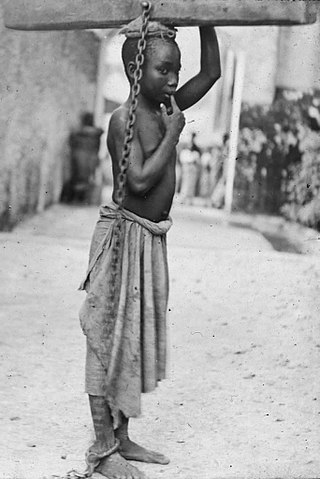
Abolitionism, or the abolitionist movement, is the movement to end slavery and liberate slaves around the world.

William Wilberforce was a British politician, philanthropist, and a leader of the movement to abolish the slave trade. A native of Kingston upon Hull, Yorkshire, he began his political career in 1780, and became an independent Member of Parliament (MP) for Yorkshire (1784–1812). In 1785, he underwent a conversion experience and became an Evangelical Anglican, which resulted in major changes to his lifestyle and a lifelong concern for reform.

The Act Prohibiting Importation of Slaves of 1807 is a United States federal law that prohibited the importation of slaves into the United States. It took effect on January 1, 1808, the earliest date permitted by the United States Constitution.

William Edward Burghardt Du Bois was an American sociologist, socialist, historian, and Pan-Africanist civil rights activist.
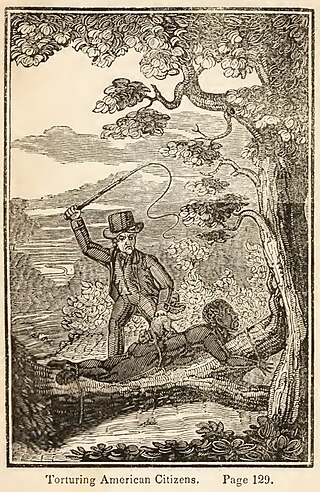
The legal institution of human chattel slavery, comprising the enslavement primarily of Africans and African Americans, was prevalent in the United States of America from its founding in 1776 until 1865, predominantly in the South. Slavery was established throughout European colonization in the Americas. From 1526, during the early colonial period, it was practiced in what became Britain's colonies, including the Thirteen Colonies that formed the United States. Under the law, an enslaved person was treated as property that could be bought, sold, or given away. Slavery lasted in about half of U.S. states until abolition in 1865, and issues concerning slavery seeped into every aspect of national politics, economics, and social custom. In the decades after the end of Reconstruction in 1877, many of slavery's economic and social functions were continued through segregation, sharecropping, and convict leasing.

Thomas Clarkson was an English abolitionist, and a leading campaigner against the slave trade in the British Empire. He helped found the Society for Effecting the Abolition of the Slave Trade and helped achieve passage of the Slave Trade Act 1807, which ended British trade in slaves.

The Slave Trade Act 1807, officially An Act for the Abolition of the Slave Trade, was an Act of the Parliament of the United Kingdom prohibiting the slave trade in the British Empire. Although it did not automatically emancipate those enslaved at the time, it encouraged British action to press other nation states to abolish their own slave trades. It took effect on 1 May 1807, after 18 years of trying to pass an abolition bill.

Herbert Aptheker was an American Marxist historian and political activist. He wrote more than 50 books, mostly in the fields of African-American history and general U.S. history, most notably, American Negro Slave Revolts (1943), a classic in the field. He also compiled the 7-volume Documentary History of the Negro People (1951–1994). In addition, he compiled a wide variety of primary documents supporting study of African-American history. He was the literary executor for W. E. B. Du Bois.
African American literature is the body of literature produced in the United States by writers of African descent. Olaudah Equiano was an African man who wrote The Interesting Narrative of the Life of Olaudah Equiano, an autobiography published in 1789 that became one of the first influential works about the transatlantic slave trade and the experiences of enslaved Africans. His work was published sixteen years after Phillis Wheatley's work. She was an enslaved African woman who became the first African American to publish a book of poetry, which was published in 1773. Her collection, was titled Poems on Various Subjects, Religious and Moral.

The Slavery Abolition Act 1833 was an Act of the Parliament of the United Kingdom which provided for the gradual abolition of slavery in most parts of the British Empire. Passed by Earl Grey's reforming administration, it expanded the jurisdiction of the Slave Trade Act 1807 and made the purchase or ownership of slaves illegal within the British Empire, with the exception of "the Territories in the Possession of the East India Company", Ceylon, and Saint Helena. The Act came into force on 1 August 1834, and was repealed in 1998 as a part of wider rationalisation of English statute law; however, later anti-slavery legislation remains in force.
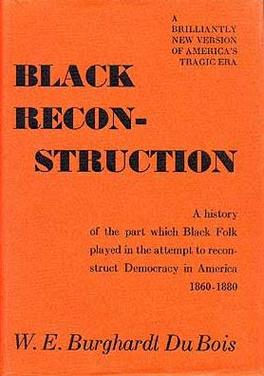
Black Reconstruction in America: An Essay Toward a History of the Part Which Black Folk Played in the Attempt to Reconstruct Democracy in America, 1860–1880 is a history of the Reconstruction era by W. E. B. Du Bois, first published in 1935. The book challenged the standard academic view of Reconstruction at the time, the Dunning School, which contended that the period was a failure and downplayed the contributions of African Americans. Du Bois instead emphasized the agency of Black people and freed slaves during the Civil War and Reconstruction and framed the period as one that held promise for a worker-ruled democracy to replace a slavery-based plantation economy.
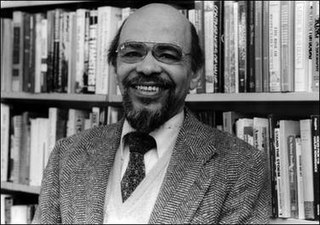
Nathan Irvin Huggins was a distinguished American historian, author and educator. As a leading scholar in the field of African American studies, he was W. E. B. Du Bois Professor of History and of Afro-American Studies at Harvard University as well as director of the W. E. B. Du Bois Institute for Afro-American Research. He died of cancer in Cambridge, Massachusetts, aged 62.

Slavery in Britain existed before the Roman occupation and endured until the 11th century, when the Norman conquest of England resulted in the gradual merger of the pre-conquest institution of slavery into serfdom. Given the widespread socio-political changes, all slaves were no longer recognised separately in English law or custom. By the middle of the 12th century, the institution of slavery as it had existed prior to the Norman conquest had fully disappeared, but other forms of unfree servitude continued for some centuries.
Brian Kelly is an American historian and a lecturer in US history, teaching at Queen's University Belfast in Northern Ireland. His work is concerned mainly with labor and race in the American South, although much of his most recent scholarship focuses on the formative struggles around slave emancipation during the American Civil War and the Reconstruction Era that followed.

Walter Johnson is an American historian, and a professor of History and of African and African-American Studies at Harvard University, where he previously (2014–2020) directed the Charles Warren Center for Studies in American History.

Gerald Horne is an American historian who holds the John J. and Rebecca Moores Chair of History and African American Studies at the University of Houston.
The Negro in the South is a book written in 1907 by sociologist W. E. B. Du Bois and educator Booker T. Washington that describes the social history of African-American people in the southern United States. It is a compilation of the William Levi Bull Lectures on Christian Sociology from that year. Washington and Du Bois had recently co-contributed to the Washington-edited 1903 collection The Negro Problem.

Abolitionism in the United Kingdom was the movement in the late 18th and early 19th centuries to end the practice of slavery, whether formal or informal, in the United Kingdom, the British Empire and the world, including ending the Atlantic slave trade. It was part of a wider abolitionism movement in Western Europe and the Americas.

The movement to reopen the transatlantic slave trade was an 1850s American campaign by white Southerners, many of them future Confederates, to repeal the 1808 Act Prohibiting Importation of Slaves and restart the transatlantic slave trade. Due to their foundational role in the Southern economy, and in part due to rampant speculation, slaves had become very expensive. Advocates for restarting slave imports hoped to drive down prices by increasing supply, making slave ownership more accessible to those outside the planter class, and making individual slaves cheaper and more disposable, in the hopes that it would secure the political future of slavery in the United States.
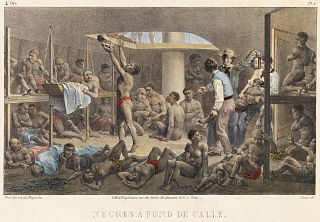
Black Cargoes: A History of the Atlantic Slave Trade 1518–1865 by Daniel P. Mannix in collaboration with Malcolm Cowley was published in 1962 during the civil rights movement in the United States prior to the passage of the Civil Rights Act of 1964. It was the first book on the Atlantic slave trade since The American Slave Trade: An Account of Its Origin, Growth and Suppression published in 1900 by John Randolph Spears. It had a narrative format and was widely recognized in the popular press at the time including Time magazine and the New York Times and was praised in academic articles. The New York Times review indicated that its subject had "special current overtones". One of the chapters, The Middle Passage was published separately in American Heritage magazine, also in 1962.
















